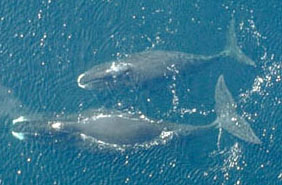
Slow ships down to protect whales in the Arctic
As shipping continues to expand in the Arctic, whales in the region are expected to experience increased impacts as a result of underwater noise and ship strikes. A recent study looking at stress levels of right whales in Canada’s Bay of Fundy found that those levels dropped off significantly immediately after September 11, 2011, when shipping along the east coast essentially ceased in the wake of the terrorist attacks. Stress is thought to make whales more vulnerable to disease and less likely to produce offspring. For the first time, this study documents that exposure to underwater noise may be linked to chronic stress in whales, and shows the importance of ongoing international efforts to reduce ship noise globally.
In addition, increased vessel activity in the Arctic could increase interactions, and collisions, with whales. For large whales like the North Atlantic right whale, which probably number less than 400 animals, ship strikes are a leading cause of mortality — and an obstacle to the species’ recovery. Fortunately, there are well-established, cost-effective ways to minimize potential harm to whales. One way is to establish shipping lanes around areas where whales are known to congregate or pass through. Another option, especially in areas where re-routing vessels is difficult, is to have ships slow down. Evidence indicates that slower speeds may reduce the chance of a ship strike as well as its severity. Moreover, a reduction in speed from 16 knots to 12 knots, for example, could reduce noise pollution by over 80 percent.
Research is continually revealing the dangers that shipping poses to whales and other marine mammals, and with more shipping anticipated for the Arctic Ocean greater attention needs to be given to management measures in the region that will ensure species protection amidst growing levels of commercial activity.
Documents
* Documents have been submitted by the United States and by Friends of the Earth and eNGO partners, respectively, to the Ship Design and Equipment Sub-Committee, Safety of Navigation Sub-Committee, and Marine Environment Protection Committee of the International Maritime Organization (a U.N. specialized agency that develops and adopts global shipping standards) pertaining to polar voyage planning and whale protection.
Photo credit: Dave Rugh, NOAA
Related Posts
Ways to Support Our Work

Read Latest News
Stay informed and inspired. Read our latest press releases to see how we’re making a difference for the planet.

See Our Impact
See the real wins your support made possible. Read about the campaign wins we’ve fought for and won together.

Donate Today
Help power change. It takes support from environmental champions like you to build a more healthy and just world.